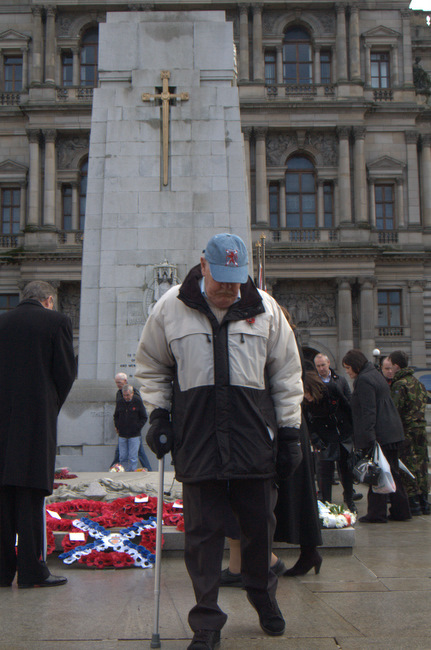
14/11/2010 Remembrance Sunday
I could make this piece about how I feel war is wrong. However this would be wrong. Remembrance Sunday is about people who lost their lives, defending their country, defending their friends and defending the immaterial concepts we enjoy every day, in the sense of peace and freedom.
Ninety years since the first Remembrance Day in 1920, to remember the dead of World War One, the civilians, soldiers and veterans come to Glasgow’s George’s Square to honour and celebrate the sacrifices made by people who could not be here today. Although to walk through Glasgow City Centre, it could have been any other day as the shops are still open and trading, as the daily business of life continues.
After the 2 minutes silence hailed in by the haunting and emotion provoking Last Post, the prayers and hymns are offered as a symbol of humility and gratitude. There are many people here, braving the cold and partial showers. It is not just members of the armed services here to remember, as Strathclyde Police give rosettes of poppies, along with the fire service and other civilian services. As the marchers pass by the huddling masses, only separated by the grey steel railings, there is applause – to celebrate rather than to grieve or pity as the gratitude here is unflinching.
However, the focus was not on Armistice Day, 1918. There has been much waste and bloodshed since then, since VJ Day 1945 as well. Wars and armed conflict which do not automatically fall in to the nation's consciousness include India, Palestine, Malaya, Korea, Egypt (Suez Zone), Kenya, Cyprus, the Falklands War, the Gulf War, Bosnia, Kosovo, Sierra Leone, Afghanistan and Iraq.
After the service is over and looking at the cenotaph, you will see many poppies adorning the fern and lions looking proudly in guard of their memory. Those poppies have been laid by the lucky ones. A Royal Engineer, who served in Myanmar (Burma) during the conflict there, is asked to pose for photographs he obliges and is thanked for his troubles. The Garden of Remembrance is observed with dignified respect “to honour”, as the board says, “the dead and remember the living”.
There are many activities which can be said to be haunting or harrowing, symbolic and emotional, but by far the most poignant act of the day was the laying of a handmade cloth poppy with the simple message, “lest we forget”.
